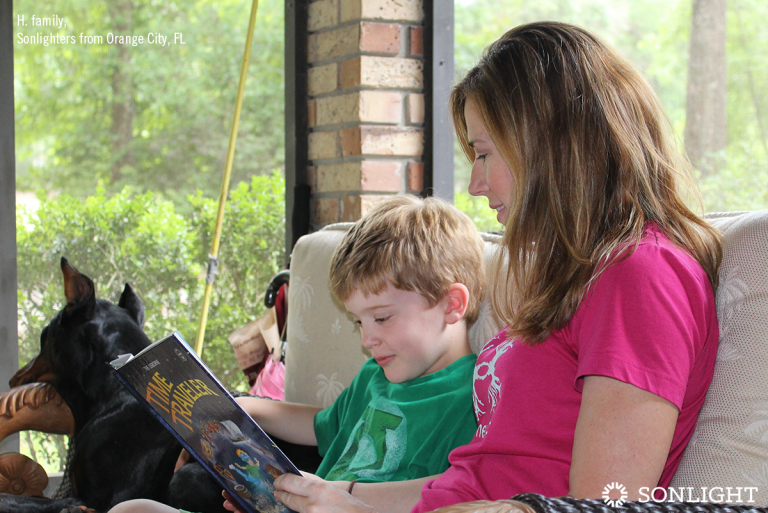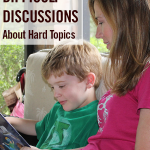
“Do we really need to tell a Kindergartener about Hitler?” I wondered when I saw Twenty and Ten by Claire Huchet Bishop in our collection of Kindergarten Read-Alouds.
The same day I opened that box from Sonlight and wondered about introducing WW2 to my young child, a girl in my daughter’s gymnastics class wished her father farewell for his second tour of duty in Iraq.
My mind shifted from my original question, and I asked myself instead, “Do we have a duty to our children to explain war and other difficult and painful topics?” The answer is yes, we do. If we don’t step in to help our children understand their world, others will. Books like Twenty and Ten are a wonderful way to introduce difficult concepts in a safe and supportive environment.
Books Help Tackle Tough Issues
As much as we would like to protect our children from all the bad things in the world, it’s not possible. Bad things and bad people are part of our life. Within my daughter’s first five years, she had to say goodbye to two grandparents and an uncle as well as multiple family pets. She’s been alive during unimaginable terrorist attacks and unforeseen natural disasters.
While it’s true that the world isn’t necessarily worse (I certainly am grateful not to have personally experienced the plague or Hitler’s regime), there are still plenty of horrible happenings. With social media and news invading our homes from every available port, it is more critical than ever to confront these issues alongside our children with faith, discretion, and compassion.
Good books that tackle hard issues are a valuable method of relating to our kids. These types of books are a critical part of our choice to use Sonlight homeschool curriculum. Reading aloud and then discussing these stories has helped us have conversations about difficult issues like death and illness. When we read about the persecution of Jews in World War II Germany, my husband and I had the opportunity to share our family values with our children.
Starting the Conversation, Inspired by Literature
Getting kids to start talking is made immeasurably easier when you are sharing a story. The characters, issues, and ideas generated by a third party (the book) allow for more discussion and less lecture. Young children like my preschooler and Kindergartener often don’t know the right words to express their feelings. But books give them an avenue—and the vocabulary—to broach hard topics with a safe amount of distance.
A recent Read-Aloud from History / Bible / Literature A, Adventures With Waffles by Maria Parr, gave my kids a chance to ask questions about characters who were ill, who had died, and who were growing up in a single parent household. Although my children have experienced many of these issues with family and friends, the story provided a safe place to discuss these painful realities. Their questions ran the gamut from simple to deep and from factual to personal:
- What does widow mean?
- What happens when you die?
- Why does Jesus let little kids die?
- Is that what happened to Aunt G?
Introducing Difficult Discussions with Books
Books offer us a chance to introduce troubling issues in the comfort of our own home where conversation is safe. Kids learn about scary events in a situation where they can ask honest questions and share real concerns.
The discussion topics introduced in books don't have to be as grand or tragic in scale as war, slavery, or terrorism. Conversations about morality and character are inspired by the books we read. When we read The Light at Tern Rock, we discussed forgiveness. Adventures With Waffles led us into conversations about friendship and how important it is for friendship to be returned.
Sharing Personal Values and Stories
Books also open the door to sharing our own personal values and stories. As veterinarians, my husband and I have a special relationship with animals and great respect for wildlife. When we read Capyboppy by Bill Peet, we had a chance to share our many experiences with animals kept in unconventional and often unreasonable situations.
Books are powerful tools in our parent and homeschool arsenal. Bravely opening the pages of books that discuss difficult topics gives us the chance to remove the stigma from controversial topics and provide a safe zone for our family to discuss difficult issues.
Try a Sonlight program, and take up to a year to see if Sonlight is right for your family with our Love to Learn, Love to Teach™ Guarantee. No other homeschool curriculum provider has such a comprehensive promise. See the details here.








Yes! Yes! and Yes! Those are 3 of the best examples for using books early :)
We have 100 Dresses on our schedule for later this year :) I can't wait! I love discovering stories that carry a deep impact for us and for our kids.
SO very true; we turned to books when the boys could not understand why a younger family member passed away, when they asked where babies come from, and when learning about things like war and prejudice. Great books spark wonderful discussions and stay with us long after we're done reading.
This is such a great perspective. We have covered so many broad and deep subjects, because of the books that we are reading in our Sonlight Core. I read the book “100 Dresses” and loved the lesson of empathy and kindness in the face of diversity. My kids were impacted deeply by the story even years later.
...and I still use the story of “Ping” to remind my kids to not be last when I call.